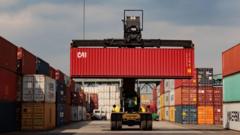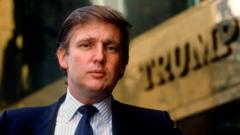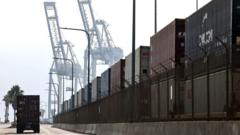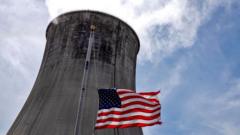### Summary: While President Trump's proposed tariffs on Chinese goods pose a threat to the economy, experts say China faces far more significant challenges, including a deepening property crisis, waning consumer confidence, and a retreat of foreign businesses looking to invest. These factors could hinder the nation’s ability to sustain growth in 2024 and beyond.
### Title: Beyond Tariffs: The Multi-Faceted Economic Challenges Facing China
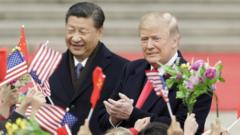
### Title: Beyond Tariffs: The Multi-Faceted Economic Challenges Facing China
### Description: As China strives to meet its growth targets, it grapples with more than just American tariffs, including a struggling property market, low consumer spending, and decreasing foreign investment.
China's economy recently posted a 5% growth in the last quarter of 2024, a figure that underscores the government's efforts to rebound from significant economic challenges. However, this represents one of the slowest growth rates in recent decades, as issues such as a protracted property crisis, soaring local government debt, and high youth unemployment continue to undermine economic stability. While China is facing potential tariffs on $500bn worth of goods from the United States, experts suggest that tariffs are not the sole hurdle for the Chinese economy.
1. **Export Complications from Tariffs**: One prominent concern is how tariffs are impacting Chinese exports. With a significant portion of last year’s growth attributed to exports, warnings abound regarding a potential slowdown in 2025. A continuing trade conflict with the U.S. may push Chinese exporters toward emerging markets with less purchasing power, ultimately jeopardizing sales and profitability. As China attempts to transition into a high-tech economy by 2035, the question remains as to how manufacturing can remain a growth engine amid tightening international trade conditions.
2. **Sluggish Domestic Spending**: Another critical area of concern is consumer expenditure. Prior to the property market's difficulties, real estate investments accounted for a significant share of household wealth in China. However, government initiatives to stabilize housing have yet to resolve the oversupply issue, leaving many properties unoccupied and pressuring home values. This slowdown in the housing market directly impacts domestic consumption, with household spending plummeting significantly since the pandemic. Experts warn that without better income distribution and job creation, consumer confidence will not rebound convincingly.
3. **Declining Foreign Investment Interest**: Furthermore, there is a noticeable decline in the enthusiasm of foreign companies to invest in China. Although President Xi Jinping has promoted investment in advanced industries, geopolitical uncertainties and concerns over the sustainability of economic growth have dampened investor interest. Industry experts believe that businesses are seeking more diverse investment opportunities elsewhere, signaling a shift away from China's previously attractive market.
With rising public debt and persistent unemployment, which particularly affects younger demographics, the need for transformative economic policies is urgent. Social unrest has also emerged due to economic grievances, showcasing a delicate balance for the ruling Communist Party as it strives to maintain stability against a backdrop of slowing growth.
In conclusion, while tariffs proposed by President Trump present immediate risks, the multi-dimensional challenges inherent in China's economic landscape suggest that the nation must address deeper structural issues to ensure sustainable growth moving forward.


